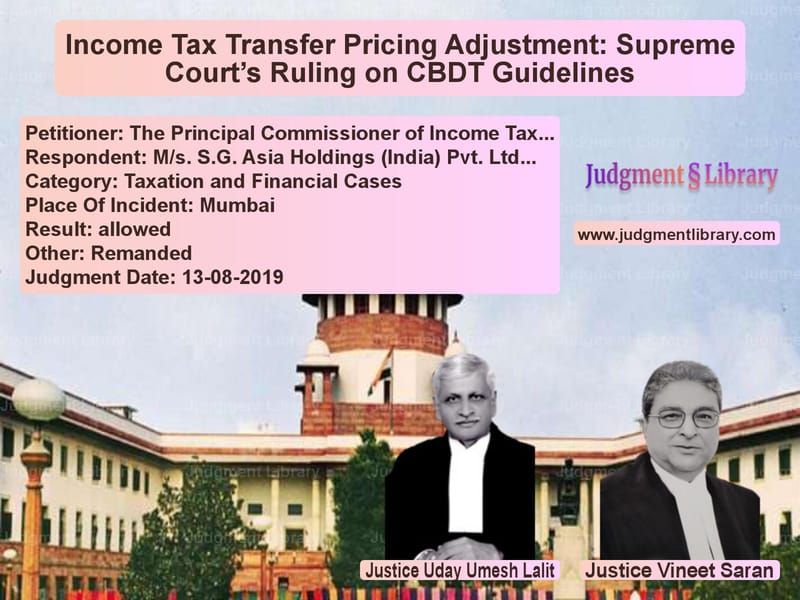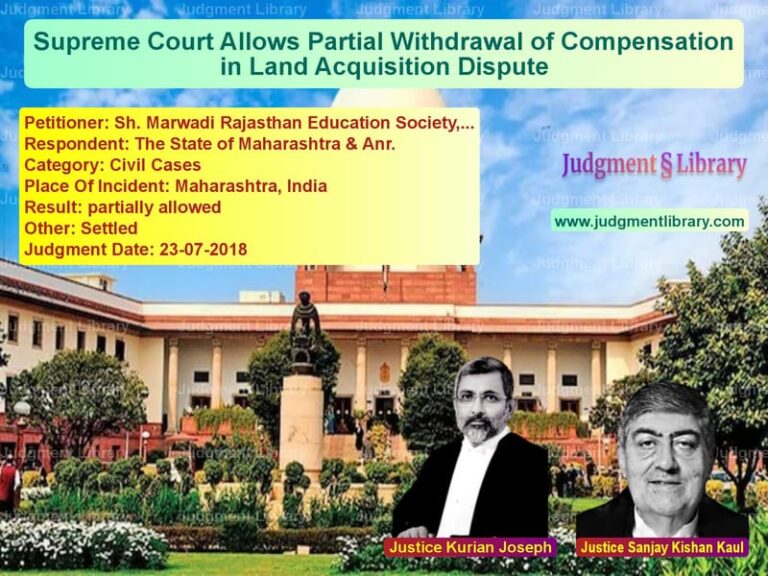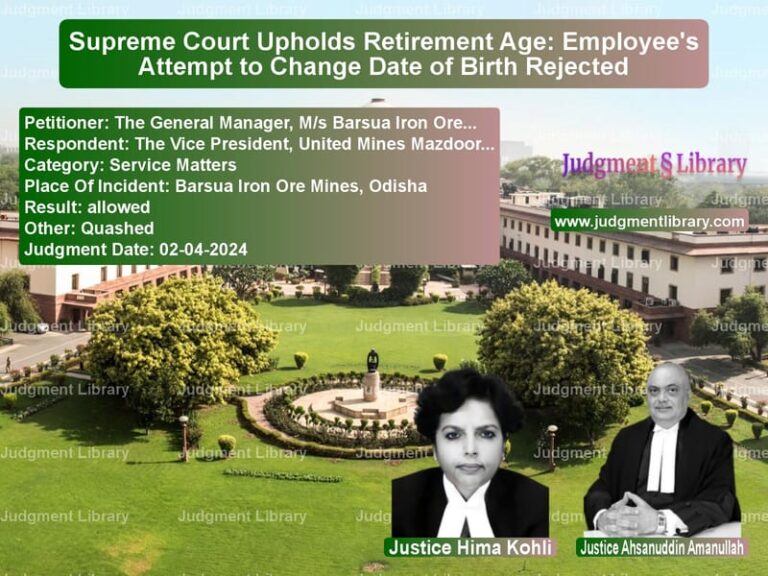Income Tax Transfer Pricing Adjustment: Supreme Court’s Ruling on CBDT Guidelines
The case of The Principal Commissioner of Income Tax-4, Mumbai v. M/s. S.G. Asia Holdings (India) Pvt. Ltd. pertains to a dispute over transfer pricing adjustments made by the Income Tax Department. The Supreme Court was called upon to decide whether the assessing officer (AO) had erred in failing to refer the matter to the Transfer Pricing Officer (TPO) as per the guidelines laid down by the Central Board of Direct Taxes (CBDT).
Background of the Case
The respondent, M/s. S.G. Asia Holdings (India) Pvt. Ltd., had received brokerage income from its parent company. During assessment proceedings, the Income Tax Department scrutinized the rate of brokerage charged by the respondent and found it to be lower than market rates. Consequently, an addition of Rs. 2,89,82,746/- was made to the respondent’s taxable income under Section 92 of the Income Tax Act, 1961.
The respondent challenged the addition before the Commissioner of Income Tax (Appeals) [CIT(A)], but the appeal was dismissed. The matter was then taken to the Income Tax Appellate Tribunal (ITAT), which ruled in favor of the respondent, stating that the transfer pricing adjustment was invalid since the AO had not referred the case to the TPO as required under CBDT Instruction No. 3/2003.
Arguments of the Parties
Appellant (Income Tax Department):
- The AO has discretionary power under Section 92CA of the Income Tax Act to decide whether or not to refer a case to the TPO.
- The AO had sufficient material to determine the arm’s length price without requiring intervention from the TPO.
- ITAT erred in invalidating the entire transfer pricing adjustment instead of remanding the matter back to the AO.
Respondent (M/s. S.G. Asia Holdings India Pvt. Ltd.):
- As per CBDT Instruction No. 3/2003, any international transaction exceeding Rs. 5 crore must be referred to the TPO.
- The AO had failed to follow the mandatory guidelines, making the transfer pricing adjustment legally untenable.
- Since the AO did not refer the case to the TPO, the entire adjustment was void ab initio.
Supreme Court’s Observations
The Supreme Court examined whether the failure of the AO to refer the case to the TPO was a mere procedural lapse or a fundamental error rendering the assessment invalid. The Court referred to CBDT Instruction No. 3/2003, which states:
“Wherever the aggregate value of international transactions exceeds Rs. 5 crores, the case should be picked up for scrutiny and reference under Section 92CA be made to the TPO.”
The Court noted that the AO had exceeded his jurisdiction by making a transfer pricing adjustment without seeking guidance from the TPO. The Tribunal was correct in holding that the adjustment was contrary to CBDT instructions.
Supreme Court’s Judgment
The Supreme Court upheld the ITAT’s ruling but clarified that the matter should have been remanded to the AO for reconsideration:
“By not making reference to the TPO, the AO has breached the mandatory instructions issued by the CBDT. However, the Tribunal ought to have remanded the matter to the AO so that the appropriate reference could be made to the TPO.”
The Court allowed the appeal to the extent that the matter would be sent back to the AO for proper evaluation under the CBDT guidelines.
Key Takeaways from the Judgment
- The failure of the AO to refer a case to the TPO when required by CBDT guidelines constitutes a serious procedural lapse.
- The assessment order remains valid, but any transfer pricing adjustment made without TPO involvement is unlawful.
- The ITAT should have remanded the case for proper assessment rather than nullifying the adjustment entirely.
Implications of the Judgment
This ruling underscores the importance of procedural compliance in transfer pricing cases. It reaffirms that AOs must strictly follow CBDT instructions, ensuring uniformity in transfer pricing assessments. The decision also clarifies that procedural lapses do not necessarily invalidate an assessment but require rectification by remanding the matter to the AO.
Conclusion
The Supreme Court’s decision in this case reinforces the procedural discipline required in transfer pricing matters. It highlights the necessity for AOs to adhere to CBDT guidelines and ensures that tax assessments involving international transactions are carried out with due process. This judgment sets a precedent for future cases, emphasizing the critical role of the TPO in determining arm’s length pricing.
Petitioner Name: The Principal Commissioner of Income Tax-4, Mumbai.Respondent Name: M/s. S.G. Asia Holdings (India) Pvt. Ltd..Judgment By: Justice Uday Umesh Lalit, Justice Vineet Saran.Place Of Incident: Mumbai.Judgment Date: 13-08-2019.
Don’t miss out on the full details! Download the complete judgment in PDF format below and gain valuable insights instantly!
Download Judgment: The Principal Commis vs Ms. S.G. Asia Holdi Supreme Court of India Judgment Dated 13-08-2019.pdf
Direct Downlaod Judgment: Direct downlaod this Judgment
See all petitions in Income Tax Disputes
See all petitions in Tax Evasion Cases
See all petitions in Tax Refund Disputes
See all petitions in Judgment by Uday Umesh Lalit
See all petitions in Judgment by Vineet Saran
See all petitions in allowed
See all petitions in Remanded
See all petitions in supreme court of India judgments August 2019
See all petitions in 2019 judgments
See all posts in Taxation and Financial Cases Category
See all allowed petitions in Taxation and Financial Cases Category
See all Dismissed petitions in Taxation and Financial Cases Category
See all partially allowed petitions in Taxation and Financial Cases Category







